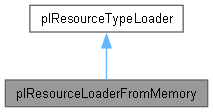 |
Plasma Engine
2.0
|
 |
Plasma Engine
2.0
|
A resource loader that is mainly used to update a resource on the fly with custom data, e.g. in an editor. More...
#include <ResourceTypeLoader.h>

Public Member Functions | |
| virtual plResourceLoadData | OpenDataStream (const plResource *pResource) override |
| Override this function to implement the resource loading. | |
| virtual void | CloseDataStream (const plResource *pResource, const plResourceLoadData &loaderData) override |
| This function is called when the resource has been updated with the data from the resource loader and the loader can deallocate any temporary memory. | |
| virtual bool | IsResourceOutdated (const plResource *pResource) const override |
| If this function returns true, a resource is unloaded and loaded again to update its content. | |
Public Attributes | |
| plString | m_sResourceDescription |
| plTimestamp | m_ModificationTimestamp |
| plDefaultMemoryStreamStorage | m_CustomData |
A resource loader that is mainly used to update a resource on the fly with custom data, e.g. in an editor.
Use like this: Allocate a plResourceLoaderFromMemory instance on the heap, using PL_DEFAULT_NEW and store the result in a plUniquePtr<plResourceTypeLoader>. Then set the description, the modification time (simply use plTimestamp::CurrentTimestamp()), and the custom data. Use a plMemoryStreamWriter to write your custom data. Make sure to write EXACTLY the same format that the targeted resource type would read, including all data that would typically be written by outside code, e.g. the default plResourceLoaderFromFile additionally writes the path to the resource at the start of the stream. If such data is usually present in the stream, you must write this yourself. Then call plResourceManager::UpdateResourceWithCustomLoader(), specify the target resource and std::move your created loader in there.
|
overridevirtual |
This function is called when the resource has been updated with the data from the resource loader and the loader can deallocate any temporary memory.
Implements plResourceTypeLoader.
|
overridevirtual |
If this function returns true, a resource is unloaded and loaded again to update its content.
Call plResource::GetLoadedFileModificationTime() to query the file modification time that was returned through plResourceLoadData::m_LoadedFileModificationDate.
Reimplemented from plResourceTypeLoader.
|
overridevirtual |
Override this function to implement the resource loading.
This function should take the information from pResource, e.g. which file to load, and do the loading work. It should allocate temporary storage for the loaded data and encode it in a memory stream, such that the resource can read all necessary information from the stream.
Implements plResourceTypeLoader.